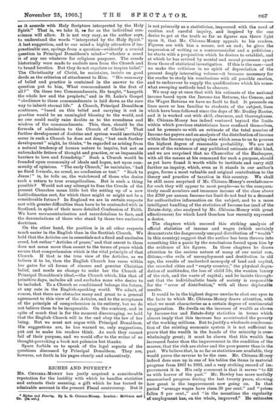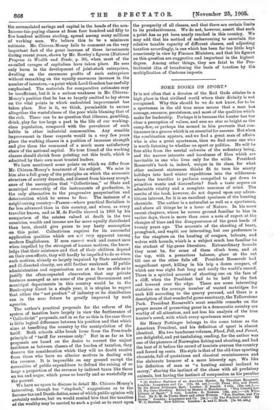We may say at once that with his estimate of
the national income based upon the Income-tax Returns, the Census, and the Wages Returns we have no fault to find. It proceeds on lines more or less familiar to students of the subject, lines which have been followed since the days of Mr. Dudley Baxter, and it is worked out with skill, clearness, and thoroughness. Mr. Chiozza-Money has indeed ventured beyond the limits within which previous statisticians have confined themselves, and he presents us with an estimate of the total number of Income-tax payers and an analysis of the distribution of income within the Income-tax-paying class which seem to us to possess the highest degree of reasonable probability. We are not aware of the existence of any published estimate of this kind, and we are surprised that no Chancellor of the Exchequer, with all the means at his command for such a purpose, should as yet have found it worth while to institute and carry still further an inquiry, which, even as it stands in our author's pages, forms a most valuable and original contribution to the theory and practice of taxation in this country. We shall be still more surprised if Mr. Chiozza-Money's revelations— for such they will appear to most people—as to the compara- tively small numbers and immense income of the class above the 2700 per annum Income-tax limit do not lead to a demand for authoritative information on the subject, and to a more intelligent handling of the statistics of Income-tax (and of the Estate-duty, also analysed by Mr. Chiozza-Money with great effectiveness) for which Lord G-oschen has recently expressed a desire.
The chapters which succeed this striking analysis of official statistics of income and wages (which certainly demonstrate the dangerously unequal distribution of "wealth" in this country) suggest that the author has been thrown into something like a panic by the conclusions forced upon him by the evidence of his figures. In these chapters be draws attention to the serious nature of many of our social con. ditions,—the evils of unemployment and destitution in old age, the results of unchecked monopoly of land and capital, the crowded cities and "empty country," the physical degra- dation of multitudes, the loss of child life, the wanton luxury of the rich, and the waste of capital; and be insists through- out that the individualistic basis of society is responsible for the "error of distribution," with all these deplorable results.
It would be in the highest degree unwise to shut our eyes to the facts to which Mr. Chiozza-Money draws attention, with what we must characterise as a certain degree of sentimental exaggeration. He dwells on the increase of wealth as shown by Income-tax and Estate-duty statistics in terms which almost imply that this increase has accentuated the poverty of the working millions. But to justify a wholesale condemna- tion of the existing economic system it is not sufficient to prove that the wealth in the hands of the minority is over- whelmingly great; it must he shown that this wealth has increased faster than the improvement in the condition of the masses, that the rich are richer and the poor poorer than in the past. We believe that, in so far as statistics are available, they would prove the reverse to be the case. Mr. Chiozza-Money indeed does sum up in one of his tables the items in material progress from 1867 to 1903, and a very striking record of im- provement it is. His only comment is that it serves "to fill us with horror of the past." Mr. Bewley has more usefully summarised progress during the last twenty years, showing how great is the improvement now going on. In that period "average wages have risen 30 per cent." and "prices fallen 8 per cent.," and "in the meantime the regularity of employment has, on the whole, improved." lie estimates
the accumulated savings and capital in the _hands of the non. Income-tax-paying classes at from four hundred and fifty to five hundred millions sterling, spread among many millions of working men. We believe this to be a minimum estimate. Mr. Chiozza-Money fails to comment on the very important fact of the great increase of these investments during recent years, shown by Mr. Bowley's figures (National Progress in Wealth and Trade, p. 30), when most of the so-called ravages of capitalism have taken place. He sees only harm in the development of joint-stock enterprises, dwelling on the enormous profits of such enterprises without remarking on the equally enormous increase in the number of investors,--a point which Lord Goschen has usefully emphasised. The materials for comparative estimates may be insufficient, but it is a serious weakness in Mr. Chiozza- Money's position that he has so largely omitted to lay stress on the vital points in which undoubted improvement has taken place. Nor is it, we think, permissible to excuse altogether the wastefulness of the poor while blaming that of the rich. There can be no question that idleness, gambling, drink, play far too large a part in the life of our working.
class population, compared with the prevalence of such habits in other industrial communities. Any sensible improvement in these respects would in a very few years place the working classes in a position of immense strength and give them the command of a much more satisfactory share of the national capital. No tree friend of the working classes should shrink from pointing out this truth, which is admitted by their own most trusted leaders.
, We have mentioned some points on which we differ from Mr. Chiozza-Money's treatment of his subjeet. We miss in him also a full grasp of the principles on which the economic structure of society depends, and dissent from his easy accept- ance of the assumption that "Collectivism," or State and municipal ownership of the instruments of production, is the only alternative to the progressive pauperisation and deterioration which he seems to fear. The instance of a neighbouring country—France—where practical Socialism is far less advanced than in this country, and where, as every traveller knows, and as M. de Foville showed in 1903 by his comparison of the estates valued at death in the two countries, wealth and income are far more equally distributed than here, should give pause to any hasty assumption on this point. Collectivism requires for its successful application qualities which are not very apparent among modern Englishmen. If men cannot work and cannot save when impelled by the strongest of human motives, the know- ledge that their existence and that of their children depend On their own efforts, they will hardly be impelled to do so when such motives, already so largely impaired by State assistance and ill-directed charity, are still further weakened. If public administration and organisation are at so low an ebb as to justify the often-repeated observation that any private business managed as are some of the great Government and municipal departments in this country would be in the Bankruptcy Court. in a single year, it is utopian to expect that either the "net product" of industry or its distribution can in the near future be greatly improved by such agencies.
The author's practical proposals for the reform of the aystem of taxation have largely in view the furtherance of "Collectivist" proposals, and in so far as this is the case there is little logical difference between his position and that which aims at benefiting the country by the manipulation of the tariff. Both schools alike break loose from the Free-trade principle of "tariff for revenue only." But in so far as his proposals are based on the desire to correct the unjust incidence as between classes of the burden of taxation, they deserve the consideration which they will no doubt receive from those who have no ulterior motives in dealing with the revenue. It is impossible on any ground except the necessities of public expenditure to defend the raising of so large a proportion of the revenue by indirect taxes like those on tea and sugar, which press so heavily and so wastefully on the poorest.
, We have no space to discuss in detail Mr. Chiozza-Money's interesting, though too "slapdash," suggestions as to the Income-tax and Death-duties, some of which public opinion will certainly endorse, but we would remind him that the taxation of the wealthy may be carried to such a point as to react upon
_





















































 Previous page
Previous page